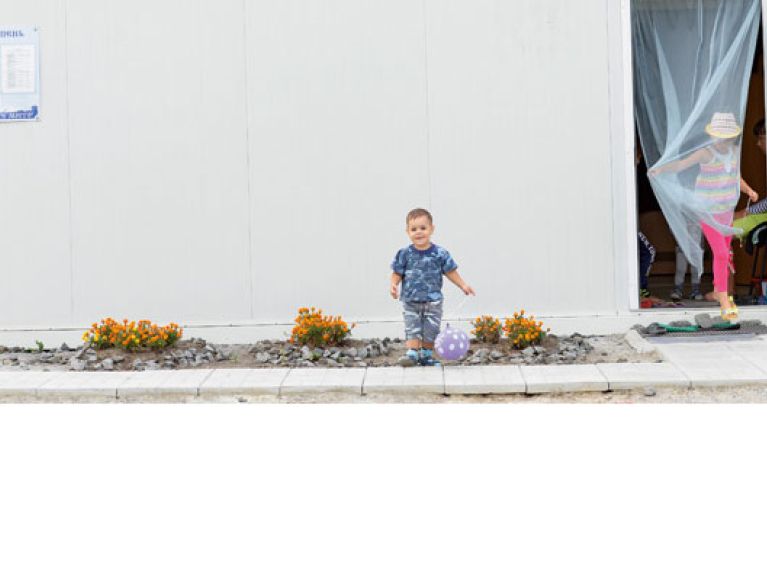Should I stay or should I go?
How Germany is generating prospects for internally displaced persons in Ukraine and for young people in Kosovo.

They are gradually adapting themselves to a new life: a young woman who used to work as a teacher back home in Donetsk now offers German classes, while another gives advice to people wishing to start their own business – previously she had her own printing company. Both are among the estimated nearly 1.4 million people who, fleeing from the war in eastern Ukraine, have moved to western parts of the country. Another million have left Ukraine altogether. Thus around 5% of the country’s total population are now what are known as internally displaced persons, or IDPs.
As early as 2014, the Deutsche Gesellschaft für Internationale Zusammenarbeit (GIZ) set up accommodation for these IDPs on behalf of Germany’s Federal Government. Within a period of four months, seven container villages were constructed for around 3,500 people in the districts of Dnipropetrovsk, Kharkiv and Zaporizhia. The local authorities prepared the land and arranged electricity, water and waste water lines, while German companies erected the containers. All of the accommodation has disabled access, and sports facilities and communal areas are being built.
It takes more than just a roof over one’s head to generate new prospects, however, which is why the GIZ is now working with local partners to offer language and computer courses as well as training in service occupations. Residents have to contribute the equivalent of five euros per month towards the costs of housing and these classes, while the rest of the running costs are paid by Ukraine.
Places have been found in local nurseries and schools for the children and young people from these makeshift villages. Some of the men have found work. Uwe Stumpf from the GIZ explains that there is hardly any conflict with the local community. “People were given a warm welcome in a spirit of solidarity. The new arrivals are fitting in well, partly thanks to the overwhelming commitment shown by the Ukrainian volunteers.”
The situation remains difficult all the same. “What was originally planned to be a transitional period is increasingly looking like becoming a longer-term solution,” says Stumpf. “The majority of the internally displaced persons will probably remain here permanently.“ While many shuttle back and forth to the conflict region, they have been forced to accept that the security situation will not permit them to return there once and for all. Numerous people have already spent a year in the makeshift villages, while around 1,700 are still waiting for a place there.
Scene change: roughly 1,200 kilometres to the southwest lies Pristina, the capital of Kosovo. Here it is also a question of finding new possibilities – for people who are thinking about fleeing and for those who have fled but then returned. The political situation in this small and still young country is unstable and the social challenges are considerable. The unemployment rate is officially 35%, while youth unemployment exceeds 60%. Young Kosovans in particular are looking towards Germany, where they believe they have better prospects on the employment market – yet they know little about their rights to stay there.
The German Federal Government is therefore stepping up its efforts to provide them with information directly. In May 2015, Economic Cooperation and Development Minister Gerd Müller opened the German Information Point for Migration, Vocational Training and Career (DIMAK). The GIZ-run centre is initially to remain open for one year.
DIMAK is all about providing work and training opportunities. “Not only in Germany, but also in Kosovo,“ says GIZ Country Director James Macbeth. “We point out the opportunities that there are in the country here: in wine-growing, in agriculture, in IT and in mechanical engineering.” It is young people above all who come to the DIMAK, with around 40 visitors per day. School and university students, employees and the unemployed take advantage of the services on offer here. The centre organises training courses in how to apply for jobs and courses in setting up one’s own business. It also provides information about legal ways to go to Germany.
There are certainly prospects for young Kosovans there, says Macbeth. “Their basic education is good and their motivation is high.” Word that this is the case has also got around in Germany. From the summer, church-based social welfare service Diakonie Baden-Württemberg will for example be training more than 50 young Kosovans as geriatric care nurses. Small and medium-sized businesses as well as craft and skilled trade companies are also open to young people from Southeast Europe.
DIMAK’s staff are not simply waiting for people to turn up in Pristina. “We go out into the countryside and offer information events in villages.” There is also close cooperation with the Kosovan employment ministry, which will take over the centre in the medium term. Local companies can also obtain information from DIMAK, and a joint jobs fair was staged at the end of 2015. DIMAK is regarded as a success – and could prove to be a good model for other countries. ▪

